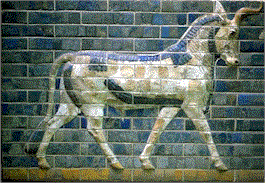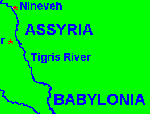|
Nation
in southern Mesopotamia that conquered
the southern kingdom of Judah.
|
Babylonia is a region
in southern Mesopotamia. Its name is taken from the capital city of Babylon,
which was located on the Euphrates River. The height of the Babylonian empire
extended from their victory over the Assyrians in 609 B.C. until they were
defeated by the Persians in 539 B.C.
 |
Ornamental Bull from the Gate at
Babylon 6th cent. B.C. |
The story of the
tower of Babel, where God confused people's speech, is set in Babylonia
(Gen 11:1-9).  Abraham migrated from Ur in this region
to Haran and later to Canaan (Gen 11:31). In the eighth century B.C.,
King Hezekiah of Judah began to establish friendly
relations with Babylonia in the hope gaining support against the threat
of Assyrian expansion. In 609 B.C. King Josiah joined the Babylonians
in rebelling against Assyria. Josiah was killed, but the Babylonians
prevailed and made Assyria a part of their empire. Judah was a vassal
of the Babylonians for a time. Some Judeans were deported in 597 and in
587 the Babylonians conquered Jerusalem, destroyed
the Temple, and exiled many of the people to Babylonia. After the Persians
conquered Babylon in 539 B.C., the Persian king Cyrus allowed Jewish exiles
to return to Jerusalem, although a significant Jewish population remained
in Babylonia for centuries.
Abraham migrated from Ur in this region
to Haran and later to Canaan (Gen 11:31). In the eighth century B.C.,
King Hezekiah of Judah began to establish friendly
relations with Babylonia in the hope gaining support against the threat
of Assyrian expansion. In 609 B.C. King Josiah joined the Babylonians
in rebelling against Assyria. Josiah was killed, but the Babylonians
prevailed and made Assyria a part of their empire. Judah was a vassal
of the Babylonians for a time. Some Judeans were deported in 597 and in
587 the Babylonians conquered Jerusalem, destroyed
the Temple, and exiled many of the people to Babylonia. After the Persians
conquered Babylon in 539 B.C., the Persian king Cyrus allowed Jewish exiles
to return to Jerusalem, although a significant Jewish population remained
in Babylonia for centuries.
|